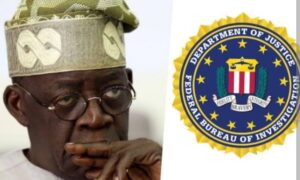A U.S. federal judge had ordered the FBI and the DEA to release investigative records relating to Tinubu, stemming from a purported narcotics trafficking investigation in the 1990s.
According to PREMIUM TIMES, Judge Beryl Howell of the U.S. District Court for the District of Columbia handed down the order on Tuesday, rejecting the government agencies’ attempts to withhold the documents under the so-called “Glomar response” — a policy allowing agencies to refuse to confirm or deny the existence of records.
“The claim that the Glomar responses were necessary to protect this information from public disclosure is at this point neither logical nor plausible,” Judge Howell ruled, affirming that both the FBI and DEA failed to justify their refusals under the Freedom of Information Act (FOIA).
The case was initiated by Aaron Greenspan, an American transparency advocate and founder of PlainSite.org, who filed a lawsuit in June 2023 after submitting 12 FOIA requests to various U.S. law enforcement and intelligence agencies.
These requests sought details of a federal investigation into a heroin trafficking network allegedly involving Tinubu and others, including Abiodun Agbele, Mueez Akande, and Lee Andrew Edwards.
Greenspan’s FOIA requests were earlier denied by the FBI, DEA, Internal Revenue Service (IRS), Department of State, Executive Office for U.S. Attorneys (EOUSA), and Central Intelligence Agency (CIA), all of which invoked Glomar responses.
In his lawsuit, Greenspan argued that the agencies had improperly withheld information of significant public interest.
He also cited a verified complaint filed by the U.S. Department of Justice in 1993 seeking the forfeiture of $460,000 in funds linked to Bola Tinubu, which the U.S. government alleged were proceeds of drug trafficking.
The court documents include an affidavit by Kevin Moss, a Special Agent with the IRS at the time, who detailed the activities of a heroin ring operating in the Chicago area.
The affidavit indicated that Tinubu was being investigated in connection with financial transactions that allegedly laundered proceeds from narcotics trafficking.
“There is probable cause to believe that funds in certain bank accounts controlled by Bola Tinubu were involved in financial transactions in violation of U.S. laws and represent proceeds of drug trafficking,” Moss stated in his sworn affidavit.
The same affidavit tied Tinubu to Mueez Akande and Abiodun Agbele, noting that Agbele, arrested after selling white heroin to an undercover DEA agent, cooperated with investigators and revealed further links within the network.
In response to the FOIA lawsuit, President Tinubu intervened in October 2023, citing privacy concerns and objecting to the release of “confidential tax records” and “documents from federal law enforcement agencies.”
However, Judge Howell ruled that the public interest in understanding the records surrounding Tinubu’s alleged involvement outweighed the privacy interests claimed by the President.
“The public interest in learning about a sitting president’s possible connection to a major drug investigation is undeniably significant,” the judge wrote.
Although the CIA successfully defended its Glomar response — with the court ruling that Greenspan failed to show that the agency had officially acknowledged the existence or nonexistence of responsive records — the judge ordered all other agencies, excluding the CIA, to jointly file a report by May 2 on the status of outstanding issues in the case.
The forfeiture of the $460,000 in 1993 resurfaced during the 2023 Nigerian presidential elections, as opponents of Tinubu questioned his eligibility.
However, Nigeria’s election tribunal ultimately dismissed those challenges.
Reacting to the U.S. court’s decision, Greenspan said in a statement, “Transparency must prevail over secrecy when it comes to public officials. The American public, as well as Nigerians, deserve to know the truth.”
In November 2024, it was reported that U.S. law enforcement agencies had invoked the Glomar response over requests seeking criminal investigative documents concerning President Tinubu and others.
This followed numerous Freedom of Information Act (“FOIA”) requests that Plaintiff Aaron Greenspan submitted to the FBI, CIA, DEA, Executive Office for U.S Attorneys, Department of State, and the Department of Treasury, Internal Revenue Service (IRS).
The District of Columbia case, numbered 1:23-cv-01816-BAH, involves Greenspan versus the Executive Office for U.S. Attorneys and others.
The requests sought criminal investigative documents concerning third parties, Tinubu, Lee Andrew Edwards, Mueez Akande, and Agbele, who, according to Plaintiff, participated in “an international drug trafficking and money laundering ring with operations in Chicago, Illinois.”
But the agencies insisted that disclosing information on Nigerian President Tinubu could “cause damage to U.S. national security.”
Part of the documents submitted by Greenspan to court to back his FOIA case was a verified complaint and accompanying affidavit, filed in the Northern District of Illinois by the DOJ on 26 July 1993.
The documents sought the civil forfeiture of Tinubu’s funds held by First Heritage Bank allegedly connected to the drug trafficking investigation.
The affidavit by Department of Treasury’s Internal Revenue Service (IRS) Special Agent Kevin Moss, who was involved in the investigation, detailed the drug trafficking activities of Agbele which provided the ground for seeking the forfeiture of Tinubu’s funds.
It also shared insights into how Agbele was arrested while selling white heroin to a person not known to him to be an undercover agent.
It stated that upon arrival in the United States, “Agbele identified Akande (who has also been linked to Mr Tinubu) as his uncle and stated that Akande provided him (Agbele) an apartment in Hammond, Indiana,” citing “investigating agents of DEA” as the source of this information.
Furthermore, he said according to DEA investigators, Agbele sold white heroin to another individual on numerous occasions.
With the assistance of “Source A”, DEA called Agbele to purchase a small amount of white heroin,” which resulted in a transaction where “Agbele sold one ounce of white heroin to a law enforcement officer working in an undercover capacity.”
Subsequent to this sale, “Agbele was arrested and agreed to cooperate” with the investigation.
The affidavit also states that further investigation by DEA disclosed a lease application completed by Agbele.
Moss’s affidavit confirmed that both the FBI and DEA investigated Tinubu in the wider probe into the drug trafficking activities of Agbele and other members of his ring.
It confirmed that “there is probable cause to believe that funds in certain bank accounts controlled by Bola Tinubu were involved in financial transactions” in violation of US laws “and represent proceeds of drug trafficking.”
It stated that seeking to target Tinubu’s funds arose from “investigation of money laundering of the proceeds of a heroin distribution organisation in the Chicago area.” The clues relied on were said to include “information provided by Special Agents of the IRS, DEA, (and) FBI.”
Although Tinubu forfeited the suspect funds, he has consistently denied wrongdoings. He has also never been criminally indicted or charged in the case.
There is nothing new to be revealed – Onanuga
However, the Special Adviser to the President on Information and Strategy, Mr. Bayo Onanuga has responded that the information being sought did not indict Tinubu.
He also said that there is nothing new, in the report by Agent Moss of the FBI and the DEA report, saying the report has been in the public space for more than 30 years.
According to Onanuga, “Journalists have sought the Presidency’s reaction to the ruling last Tuesday by a Washington DC judge ordering the US FBI and DEA to release reports connected with President Bola Ahmed Tinubu.
“There is nothing new to be revealed. The report by Agent Moss of the FBI and the DEA report have been in the public space for more than 30 years. The reports did not indict the Nigerian leader. The lawyers are examining the ruling.”






